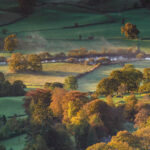In times of increasing racial tensions, it can be difficult to know what to do with one’s anger, righteous or otherwise. And it can be just as difficult to know where to get an honest picture of the worldviews of people we may consider, for whatever combination of reasons, “other.”
Earlier this month, I posted a list of 5 Contemporary Poets Christians Should Read and a follow-up on my blog with more poets Christians should read. This week, in light of our nation’s unrest and anguish, I want to offer a list of (mostly) recent poets who have spoken earnestly and powerfully about their experience of being black in America.
Listening to the cries of these poets is an act of love and solidarity. It’s a way of noticing and lamenting their struggle—a small but tangible step toward understanding the sense of degradation too often experienced by minority communities. Reading these poets won’t be comfortable and will likely make some of us angry at times—but getting angry because of injustice is biblical. As Christians we serve a God who does not shrug his shoulders at injustice, and neither should we.
Listening to the cries of these poets is an act of love and solidarity. It’s a way of noticing and lamenting their struggle.
Some of these poets are persons of faith, and others are most certainly not. But they all write prophetically, calling down fire on various forms of prejudice and other capital “s” sins. There are many more than those I list below; this is a huge genre. Some might say that it’s too much of a bad thing. Political poetry, or outrage as a headspace, isn’t somewhere you want to spend a great deal of time. But it isn’t somewhere you want to pass by either.
Terrance Hayes
Hayes’s masterpiece is Lighthead, one of my favorite books by anyone in the last 20 years. For our purposes, though, seek out his project American Sonnet for My Past and Future Assassin. The title tells you much of what you need to know about the book. He argues that people of color are disproportionately targets for assassination, that this has been the case in the past, that it will be in the future, and that all of this is a particularly American phenomenon. You wouldn’t know from the title that those words are also the name of every poem in the book, and that the sonnets are formally inventive and fun when they’re not driving stakes into the heart of a heartless—as it sometimes seems to him—system.
Justin Phillip Reed
Reed won the National Book Award a couple years ago for his book Indecency, and at first I was shocked. The only political verse I can usually get behind was written in the early 19th century by the likes of Byron and Shelley. I thought the prize might be a concession to a set of ideas the committee wanted to promote, more than to a book of enduring quality. I was wrong. This book is all spit and fire. It will make its every reader angry, regardless of where they fall on the political spectrum. But it is anger with the beauty of a ballistic missile. You know the way we somehow can’t look away from car accidents or fires? It’s like that.
Shane McRae
McRae makes lots of poems, and they tend to think about the American project, explicitly referencing Thomas Jefferson, George Washington, Donald Trump, and many others as he works through what it means to be racialized, mixed-race, or black in a society such as the one we’ve created. These are hard things to write about without sounding hysterical or hateful. McCrae manages to create some distance by often filtering his responses through outrageous things he hears on the radio or reads in the newspaper. Often there is some kind of absurdity laid bare, and often the poems are funny. Because of their linguistic intelligence, they’re nearly always smart and playful as they work through heavy themes. Start with In the Language of My Captor.
Claudia Rankine
If there’s any book on this list you’ve likely seen on a bookstore shelf, it’s this one. Citizen has sold extremely well over the last decade, in part because of clever marketing that visually tied the book to Trayvon Martin at the exact moment of that scandal. The book, for me, is an example of political poetry taken too far, willing to sacrifice poetic quality—and therefore, truth—in service of an ideology. That’s the tricky thing about the genre of political poetry: it tends to take a genre built for the eternal and date it with the concerns of a particular time and place, and it often crosses that hazy line that separates art from propaganda. Even if I don’t happen to like the writing, it’s hard to imagine any of these other books either being written or being published without Rankin’s having “gone there” with such directness in Citizen. For better or worse, Citizen has become a cultural talking point—the one book people who don’t really read poetry books are likely to know, and if only because of that, it’s worth knowing about.
Jericho Brown
Brown has just won the Pulitzer Prize for his new book, The Tradition, which screams at the distance between the ideal and the real: American ideals vs. the lived experience of African Americans, yes, but also just the distance between what any of us thought or expected life to be like and what it ends up being. It is a book of disappointments, in a word, even while it seems to believe in a grace strong enough to do something about them.
Phillis Wheatley
I never tire of recommending Wheatley’s poetry. She’s an extraordinary talent, a truth made all the more remarkable by the fact that hers was the first book published by an African American. We should let this detail sink in: the first book made by a black writer was authored by a woman, and was a poetry book of all things. I don’t know which of these is more amazing. Wheatley, having been enslaved herself, uses that experience not to say she’s unique, but to try to understand the slavery of others—either (in her era) to the British government, or to sin, which she calls as cruel a taskmaster as any human one. Her collected works are available widely. (See TGC’s article “Meet Phillis Wheatley.”)
Involved in Women’s Ministry? Add This to Your Discipleship Tool Kit.
 We need one another. Yet we don’t always know how to develop deep relationships to help us grow in the Christian life. Younger believers benefit from the guidance and wisdom of more mature saints as their faith deepens. But too often, potential mentors lack clarity and training on how to engage in discipling those they can influence.
We need one another. Yet we don’t always know how to develop deep relationships to help us grow in the Christian life. Younger believers benefit from the guidance and wisdom of more mature saints as their faith deepens. But too often, potential mentors lack clarity and training on how to engage in discipling those they can influence.
Whether you’re longing to find a spiritual mentor or hoping to serve as a guide for someone else, we have a FREE resource to encourage and equip you. In Growing Together: Taking Mentoring Beyond Small Talk and Prayer Requests, Melissa Kruger, TGC’s vice president of discipleship programming, offers encouraging lessons to guide conversations that promote spiritual growth in both the mentee and mentor.






























